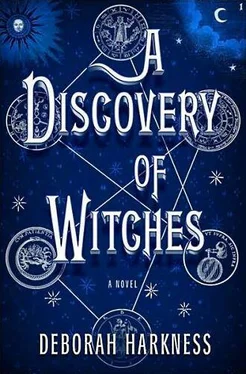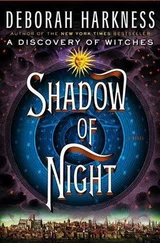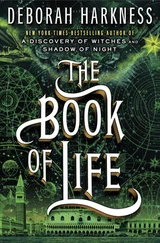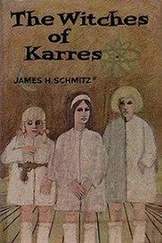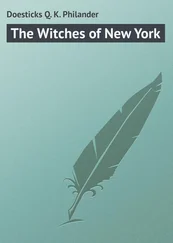There hadn’t been a hit for Clairmont at the hospital, though the affiliation was on his card. I typed “John Radcliffe Neurosciences” into the search box and was led to an overview of the department’s services. There wasn’t a single reference to a physician, however, only a lengthy list of research interests. Clicking systematically through the terms, I finally found him on a page dedicated to the “frontal lobe,” though there was no additional information.
The Wikipedia article was no help at all, and the Royal Society’s site was no better. Anything useful hinted at on the main pages was hidden behind passwords. I had no luck imagining what Clairmont’s user name and password might be and was refused access to anything at all after my sixth incorrect guess.
Frustrated, I entered the vampire’s name into the search engines for scientific journals.
“Yes.” I sat back in satisfaction.
Matthew Clairmont might not have much of a presence on the Internet, but he was certainly active in the scholarly literature. After clicking a box to sort the results by date, I was provided with a snapshot of his intellectual history.
My initial sense of triumph faded. He didn’t have one intellectual history. He had four.
The first began with the brain. Much of it was beyond me, but Clairmont seemed to have made a scientific and medical reputation at the same time by studying how the brain’s frontal lobe processes urges and cravings. He’d made several major breakthroughs related to the role that neural mechanisms play in delayed-gratification responses, all of which involved the prefrontal cortex. I opened a new browser window to view an anatomical diagram and locate which bit of the brain was at issue.
Some argued that all scholarship is thinly veiled autobiography. My pulse jumped. Given that Clairmont was a vampire, I sincerely hoped delayed gratification was something he was good at.
My next few clicks showed that Clairmont’s work took a surprising turn away from the brain and toward wolves—Norwegian wolves, to be precise. He must have spent a considerable amount of time in the Scandinavian nights in the course of his research—which posed no problem for a vampire, considering their body temperature and ability to see in the dark. I tried to imagine him in a parka and grubby clothes with a notepad in the snow—and failed.
After that, the first references to blood appeared.
While the vampire was with the wolves in Norway, he’d started analyzing their blood to determine family groups and inheritance patterns. Clairmont had isolated four clans among the Norwegian wolves, three of which were indigenous. The fourth he traced back to a wolf that had arrived in Norway from Sweden or Finland. There was, he concluded, a surprising amount of mating across packs, leading to an exchange of genetic material that influenced species evolution.
Now he was tracing inherited traits among other animal species as well as in humans. Many of his most recent publications were technical— methods for staining tissue samples and processes for handling particularly old and fragile DNA.
I grabbed a fistful of my hair and held tight, hoping the pressure would increase blood circulation and get my tired synapses firing again. This made no sense. No scientist could produce this much work in so many different subdisciplines. Acquiring the skills alone would take more than a lifetime—a human lifetime, that is.
A vampire might well pull it off, if he had been working on problems like this over the span of decades. Just how old was Matthew Clairmont behind that thirty-something face?
I got up and made a fresh cup of tea. With the mug steaming in one hand, I rooted through my bag until I found my mobile and punched in a number with my thumb.
One of the best things about scientists was that they always had their phones. They answered them on the second ring, too.
“Christopher Roberts.”
“Chris, it’s Diana Bishop.”
“Diana!” Chris’s voice was warm, and there was music blaring in the background. “I heard you won another prize for your book. Congratulations!”
“Thanks,” I said, shifting in my seat. “It was quite unexpected.”
“Not to me. Speaking of which, how’s the research going? Have you finished writing your keynote?”
“Nowhere near,” I said. That’s what I should be doing, not tracking down vampires on the Internet. “Listen, I’m sorry to bother you in the lab. Do you have a minute?”
“Sure.” He shouted for someone to turn down the noise. It remained at the same volume. “Hold on.” There were muffled sounds, then quiet. “That’s better,” he said sheepishly. “The new kids are pretty high energy at the beginning of the semester.”
“Grad students are always high energy, Chris.” I felt a tiny pang at missing the rush of new classes and new students.
“You know it. But what about you? What do you need?”
Chris and I had taken up our faculty positions at Yale in the same year, and he wasn’t supposed to get tenure either. He’d beaten me to it by a year, picking up a MacArthur Fellowship along the way for his brilliant work as a molecular biologist.
He didn’t behave like an aloof genius when I cold-called him to ask why an alchemist might describe two substances heated in an alembic as growing branches like a tree. Nobody else in the chemistry department had been interested in helping me, but Chris sent two Ph.D. students to get the materials necessary to re-create the experiment, then insisted I come straight to the lab. We’d watched through the walls of a glass beaker while a lump of gray sludge underwent a glorious evolution into a red tree with hundreds of branches. We’d been friends ever since.
I took a deep breath. “I met someone the other day.”
Chris whooped. He’d been introducing me to men he’d met at the gym for years.
“There’s no romance,” I said hastily. “He’s a scientist.”
“A gorgeous scientist is exactly what you need. You need a challenge—and a life.”
“Look who’s talking. What time did you leave the lab yesterday? Besides, there’s already one gorgeous scientist in my life,” I teased.
“No changing the subject.”
“Oxford is such a small town, I’m bound to keep running into him. And he seems to be a big deal around here.” Not strictly true, I thought, crossing my fingers, but close enough. “I’ve looked up his work and can understand some of it, but I must be missing something, because it doesn’t seem to fit together.”
“Tell me he’s not an astrophysicist,” Chris said. “You know I’m weak on physics.”
“You’re supposed to be a genius.”
“I am,” he said promptly. “But my genius doesn’t extend to card games or physics. Name, please.” Chris tried to be patient, but no one’s brain moved fast enough for him.
“Matthew Clairmont.” His name caught in the back of my throat, just as the scent of cloves had the night before.
Chris whistled. “The elusive, reclusive Professor Clairmont.” Gooseflesh rose on my arms. “What did you do, put him under a spell with those eyes of yours?”
Since Chris didn’t know I was a witch, his use of the word “spell” was entirely accidental. “He admires my work on Boyle.”
“Right,” Chris scoffed. “You turned those crazy blue-and-gold starbursts on him and he was thinking about Boyle’s law? He’s a scientist, Diana, not a monk. And he is a big deal, incidentally.”
“Really?” I said faintly.
“Really. He was a phenom, just like you, and started publishing while he was still a grad student. Good stuff, not crap—work you’d be happy to have your name on if you managed to produce it over the course of a career.”
I scanned my notes, scratched out on a yellow legal pad. “This was his study of neural mechanisms and the prefrontal cortex?”
Читать дальше
